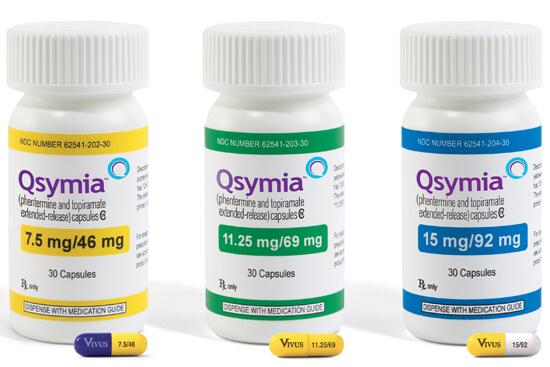
Qsymia Review - Cost, Dosage and Possible Side Effects
We all dream of being slimmer, getting in shape and taking back control of our weight loss. We want to be able to wake up, look in the mirror and feel confident in the way we look. So how can you make this happen? How can you put the ‘umph’ back into your diet?
In this article, we aim to explore the world of prescription medicine Qsymia and see what all the fuss is about. Can it really stimulate weight loss? Or is it another product overflowing with false claims?
Take a look at our Qsymia review to found out…
What is Qsymia prescribed for?
What Qsymia results can you expect?
Qsymia side effects and dangers
Why it is better to take pills with natural ingredients instead

What is Qsymia prescribed for?
Qsymia is one of many prescription medicines that is prescribed by doctors to help obese patients to lose weight.
And we don’t mean someone who has got a few pounds to shed. Qsymia is only prescribed if you have got a BMI of at least 30, or if you’ve got high blood pressure, type 2 diabetes or high cholesterol and a BMI higher than 27.
Once prescribed, you must also commit to doing regular exercise and cutting calories, otherwise its benefits will be limited.
What is Qsymia?
To understand how Qsymia works, you first need to know what it is.
Basically it is a prescribed, federally controlled substance (CIV) that contains a mixture of immediate-release phentermine hydrochloride (a sympathomimetic amine anorectic) and extended-release topiramate (a sulfamate-substituted monosaccharide) which help you to shift those pounds and keep them off.
It can be taken orally and comes in four Qsymia dosage strengths:
- Qsymia – phentermine 3.75mg and topiramate 23mg)
- Qsymia – phentermine 7.5mg and topiramate 46mg
- Qsymia – phentermine 11.25mg and topiramate 69mg
- Qsymia – phentermine 15mg and topiramate 92mg
These are not its only ingredients – although they are the most important ones. It also contains the following inactive ingredients: methylcellulose, sucrose, starch, microcrystalline, ethylcellulose, povidine and gelatin (plus a few others).
Combined, these ingredients can help you to suppress your appetite, lose weight, keep it off and improve your blood pressure and cholesterol levels.
Discover Most Dangerous Diet Pills Ingredients >>

How to use Qsymia? A correct Qsymia dosage
Qsymia cannot help you to lose weight on its own.
Yes, phentermine is an appetite suppressant, so in a way it can help you to lose weight by lowering your cravings. However, to truly succeed with this prescription drug, it should also be taken as part of a calorie controlled diet and alongside increased physical activity.
Do that, and with its support it can help you to change your behavior and eating patterns; increase the amount of energy your body uses, and leave you feeling fuller for longer (by curbing your cravings).
More importantly, it can reduce a number of health risks that can arise from obesity e.g. heart disease, diabetes, high blood pressure and ill health.
The key to succeeding is making sure you use it properly:
- This is a prescribed medicine, so you should always read the instructions carefully and make sure you keep your doctor abreast of any changes to your health or body. For instance, if you discover you’re pregnant you should tell your doctor immediately.
- This supplement can be taken with or without food, and should only be taken once a day (usually in the morning to prevent insomnia). Don’t crush or chew it, but swallow it whole. This ensures it is released into your body slowly and not all at once (minimizing the risk of Qsymia side effects).
- The amount you take will depend on your medical condition, weight and circumstances. To minimize risk, your doctor will advise you to start with a small amount of Qsymia before increasing it slowly (always follow your doctors advice to the letter –do not deviate).
- Drink plenty of liquids throughout the day to prevent the development of kidney stones.
- Do not take it with any other appetite suppressants or dietary drugs. This can increase the risk of nasty side effects.
- Do not use for a prolonged period of time.
- If used regularly or taken at a high dosage, then there is a danger of withdrawal e.g. seizures or substance abuse, as it is highly addictive. To prevent seizures from happening, you will need to decrease your Qsymia intake gradually (speak to your doctor first).
- As it can be absorbed through the skin and lungs, it can cause harm to unborn babies. So if you’re pregnant or become pregnant, you should not take this prescribed medicine.
But what about Qsymia dosage?
Like we mentioned before – the amount you take will be depend on your needs, your BMI and the extent of your condition, so we cannot give you an accurate figure. It will all hinge on what your doctor prescribes.
From what we’ve seen though, it is not uncommon for doctors to prescribe the lowest amount of Qsymia i.e. 3.75mg phentermine and 23mg topiramate once a day (take in the morning) for the first 14 days of treatment. Afterwards, your doctor may increase your dosage to 7.5mg phentermine and 46mg topiramate a day for 12 weeks.
If after these 12 weeks, you haven’t lost at least 3% of your baseline body weight, your doctor will either increase your prescriptions or tell you to stop.
Now in the event you’ve been taking the 15mg phentermine and 92mg topiramate pill; then you can’t just stop or quit as it could cause a seizure. Instead, you will have to take a reduced amount (determined by your doctor) once a day for at least a week before stopping altogether.
All that aside, this is a typical Qsymia prescription. However, it might not be what you personally get prescribed, so don’t take what we say to heart. Instead, make sure you ALWAYS follow the instructions of your doctor and NEVER increase your dosage unless they tell you to.
Remember: NOTHING is worth damaging your health over, especially weight loss.
What if you miss a dose?
If you miss a dose, you should try to take it as soon as you remember – but not too close to your bedtime, otherwise you won’t sleep.
Similarly, if for some reason you have been prescribed more than one dose a day – we highly doubt this, but it could happen – and you discover you’ve missed one, but it is close to your next one, NEVER double your dose. Instead, simply skip it and carry on with your regular schedule, as all doubling your dose will do is increase your risk of side effects.

How does Qsymia work? Qsymia vs Phentermine
Qsymia works in one of two ways – although proof of its claims are rather limited.
Phentermine is an appetite suppressant that can help to reduce cravings, lower your calorie intake and help you to feel fuller for longer. And this is great for weight loss, as it can support your goal of eating less, whilst encouraging your body to burn existing fat reserves.
Now, topiramate is typically used to treat epilepsy and migraines, so its presence is a bit odd. However, evidence suggests that together they CAN help to reduce the amount you eat; make your body use more energy during exercise, and shift excess body fat.
The only thing you need to remember is – it won’t help you to lose weight on its own. You need to put in the work; exercise more, and make a conscious decision to change your dietary habits and eat healthier. Do that, and you can witness positive weight loss results.
What Qsymia results can you expect?
The amount of weight you lose will depend on how much Qsymia you are prescribed.
In one clinical trial, patients who took the lowest Qsymia pill of 3.75mg phentermine and 23mg topiramate lost approximately 6.7% of their body weight. Whilst, those who took 7.5mg phentermine and 46mg topiramate lost 8.9% of their body weight.
True, there are higher dosages than these two, so in theory if you were prescribed to go on them you could lose even more than 9% body weight. However, it is incredibly rare for doctors to advise you to take so much, due to the amount of risks high dosages pose.
Similarly, these figures are only achievable if you stick to a healthy diet and exercise regime. If after 12 weeks, you haven’t lost 3% of your body weight, your doctor will either tell you to stop or go on a higher dose for a further 12 weeks.
But then again, if you don’t lose 5% on this high Qsymia dosage; you might be told to stop taking the pill altogether (done gradually, like we described earlier) as it is unlikely it will help you to lose the necessary amount of weight.

Qsymia side effects and dangers
In truth, Qsymia side effects are not the scariest bunch around, but still, they are not worth subjecting your body to.
Its most common side effects include: abnormal movements/sensations in your legs, arms, fingers and/or toes; dry mouth; blurry vision/dizziness; constipation, nausea and diarrhea; change in taste buds (foods can lose taste or taste strange); respiratory infections; insomnia/tiredness; urinary tract infections; decreased appetite; throat pain; heartburn; stomach discomfort/upset stomach; muscle or back pain; hair loss; mood swings/changes (suicidal behavior); confusion and loss of concentration/attention/poor memory; potassium deficiency; depression or anxiety; abnormal changes to your menstrual cycle; low blood sugar (in people with type II diabetes); racing heart/palpitations, and decreased sweating (this one is more dangerous than you think, as decreased sweating and a higher body temp/fever could result in you being hospitalized).
Its worst side effects by far have to be its seizures (if you stop taking Qsymia too quickly) and kidney stones, as they are incredibly painful to pass and can even result in you having to have them surgically removed.
However, Qsymia has also been known to cause metabolic acidosis (increased acid in the bloodstream) which can cause your bones to become brittle and soft.
Now, we know some of these Qsymia side effects look far from appetizing. But you need to consider that if your doctor has prescribed it, then they must feel that your needs are stronger than these risks.
Similarly, the danger of any of these happening will only occur if you misuse the product or take too high a dose. Use it safely, and these side effects should be minimal at best.
Just remember to speak to your doctor straight away if you ever have any trouble: concentrating/remembering things/ remembering words, or if you find it painful to urinate,; have got a fever; are struggling to breath; your heart is erratic; you lose consciousness, or you experience unusual bleeding/bruising.
To be honest – if you experience anything unusual when using this prescription drug we advise speaking to your doctor immediately. As what may start out as vomiting, mood swings or blurred vision, could easily lead to kidney stones, metabolic problems, blindness or even seizures. Scary, but sadly a real risk.
How much does Qsymia cost?
We wish we could tell you that it is cheap but that would be a lie. True, the Qsymia cost will depend on your pharmacy and how high a dose you need to take per day, but on average a month’s supply could cost you anywhere between $120 to $220.
Qsymia’s lowest dosage – at wholesale price – is around $120 a month. However, given that it isn’t sold at all pharmacies; both its lower and higher prescriptions can start from $185 per month.
Now, you might be lucky enough to get your insurance company to cover some, if not all of the cost for this prescription drug. But again this will depend on who you use.

Why it is better to take pills with natural ingredients instead
Can Qsymia really help you to lose weight? On the surface, yes it can. The combination of phentermine and topiramate means it can help to suppress your appetite, lower your calorie intake and encourage you to burn existing body fat for energy.
But, all of these results are only achievable if you put in the effort. This weight won’t magically disappear. You need to consciously eat less and exercise more alongside taking Qsymia.
Plus, you can only get this capsule if your BMI is at least 30 and your doctor has prescribed it. Qsymia is not something you can use to shift a few pounds. Nor is it something you can buy over the counter. Your doctor has to advise and arrange it all for you.
And then there are the side effects!
Sure, these are only likely to happen if you overdose or abuse Qsymia, but they still exist. They still have the power to happen. And none of them are particularly worthy of the trouble. Hair loss, constipation, vomiting, heart palpitations, dizziness, loss of focus and concentration… kidney stones! When you can offer yourself a natural alternative, why subject yourself to this?
Pills which use only natural ingredients are automatically better than chemically formulated/ synthetic ones as the risks they possess are instantly smaller.
We won’t lie and say they are none existent – it is still possible to abuse natural products – but pills with natural ingredients can offer you a legal, safe and natural way to shift those pounds without exposing your body to a whole host of dangers.
Plus, you don’t have to wait for a prescription!
Natural weight loss products are formulated from organic ingredients, which you can access from anywhere – if you put your mind to it – meaning you don’t have to be obese to find support for your weight loss.
So if you are serious about losing weight, why not consider a natural alternative instead? 100% natural and risk free, you can take charge when YOU want to.
Qsymia reviews
Alternatively, if your mind is not made up and you still want to know more about Qsymia, take a look at these Qsymia reviews.
In general, customer opinions on Qsymia are fairly mixed.
Most Qsymia reviews agree that it can do the job of reducing initial cravings and appetite. However, their opinions start to vary when they speak about its overall, long-term effectiveness – in some cases, customers only gave it two stars. This is due to the expiration date on this product. If it can’t do the job in the first 12 weeks, then most customers got told to stop using it by their doctors.
Want to know more about the customer reviews of Qsymia? There are multiple of them online.




